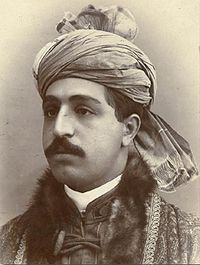

Emir of Afghanistan
1857 Kabul, Afghanistan
7 April 1914 (57) Lahore, British India
NamesMohammad Ayub Khan
Emir of Afghanistan from 1879 to 1880 For the name, see Ayub Khan. Emir of Afghanistan Mohammad Ayub Khan غازي محمد ايوب خان Emir of AfghanistanGhazi Mohammad Ayub KhanEmir of AfghanistanReign12 October 1879 – 31 May 1880PredecessorMohammad Yaqub KhanSuccessorAbdur Rahman KhanBorn1857 Kabul, AfghanistanDied7 April 1914 (aged 56–57) Lahore, British IndiaBurial1914 Peshawar, British IndiaDynastyBarakzai dynastyFatherSher Ali KhanMotherMomand Ghazi Mohammad Ayub Khan (Pashto: غازي محمد ايوب خان ; Dari: غازی محمد ایوب خان ) (1857 – 7 April 1914) also known as The Victor of Maiwand or The Afghan Prince Charlie was, for a while, the governor of Herat Province in the Emirate of Afghanistan. He was Emir of Afghanistan from 12 October, 1879 to 31 May, 1880. He also the led the Afghan troops during the Second Anglo-Afghan War and defeated the British Indian Army at the Battle of Maiwand. Following his defeat at the Battle of Kandahar, Ayub Khan was deposed and exiled to British India. However, Ayub Khan fled to Persia (now Iran). After negotiations in 1888 with Sir Mortimer Durand, the ambassador at Tehran, Ayub Khan became a pensioner of the British Raj and traveled to British India in 1888, where he lived until his death in 1914 in Lahore, Punjab. He was buried in Peshawar and had eleven wives, fifteen sons, and ten daughters. Two of his grandson, Sardar Hissam Mahmud el-Effendi and Sardar Muhammad Ismail Khan, served as Brigadier in the Pakistan Army. In Afghanistan, he is remembered as the "National Hero of Afghanistan."

We use cookies
We use cookies and other tracking technologies to improve your browsing experience on our website, to show you personalized content and targeted ads, to analyze our website traffic, and to understand where our visitors are coming from. Privacy Policy.